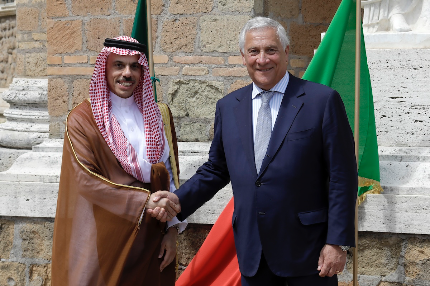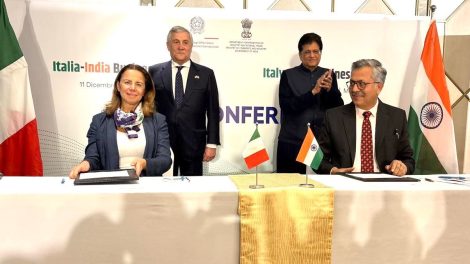Decoding the news. Over the past two years, the two countries have significantly deepened their bilateral relationship. The outcome is reflected in the strategic scope of the joint declaration, in which Rome and Riyadh:
- Call for the immediate end of the war in Gaza and the release of all hostages;
- Condemn unilateral and violent actions (by Israel) in the West Bank that undermines the two‑State solution;
- Demand unhindered access for humanitarian aid and the release of withheld Palestinian fiscal revenues;
- Reaffirm their rejection of any forced displacement of Palestinians;
- Stress that any post‑war arrangements must follow a clear timetable for a political solution that ends the occupation;
- Announce that Italy and Saudi Arabia will explore concrete forms of cooperation to strengthen the Palestinian Authority.
Between the Lines: Strategic dimension
While the immediate focus of the joint statement is Gaza—where Israel’s war against Hamas has continued for nearly two years after the Hamas’ October 7, 2023 attacks—the Italy–Saudi partnership extends well beyond the conflict.
- Rome recognises Saudi Arabia’s centrality in Middle Eastern geopolitics and its geostrategic vision of the Indo‑Mediterranean—the region linking the Wider Mediterranean and the Indo‑Pacific.
What Tajani said:
- Italy is prepared to work with Riyadh on the Cotton Road and the India–Middle East–Europe Corridor (IMEC), acknowledging the Kingdom’s central role.
- “Saudi Arabia is now part of Italy’s export plan. Our companies are ready to share their know‑how.”
- The two sides praised growing economic ties, noting trade exceeded $12 billion in 2024, and anticipated further cooperation ahead.
What Faisal bin Farhan said:
- The Saudi minister emphasised the “strong cooperation” and “convergence of views” with Italy — particularly regarding Gaza.
- He called for “peaceful solutions for all the peoples of the region” and condemned the use of force “against civilians in Gaza and the West Bank.”
- The two sides “also discussed the importance of resolving the Ukrainian crisis peacefully, with the Italian Foreign Minister commending the Kingdom’s efforts to bridge the Russian and American perspectives to find a solution to the crisis,” said Saudi MoFA.
The context. Decode39 discussed the meeting and the Rome–Riyadh relationship with experts and analysts:
- Salem Alsanbi, Italy–Saudi Business Council: “Bilateral relations are strong and diversified. Saudi Arabia is a key partner for Italy in the Gulf, with Eni and Saipem engaged in energy and infrastructure projects linked to Vision 2030.
- There are opportunities for technology transfer and joint investments in infrastructure, sports, entertainment, and industrial development,” Alsanbi added.
- Yusuf Abdul Sattar Al‑Maymani, Vice President of the Council, recalled the 1932 friendship treaty: “Riyadh remains a major supplier of oil and petrochemicals to Italy, while Italian exports continue to grow in industrial and manufacturing sectors.”
- Al‑Maymani further highlighted “the role of institutions and chambers of commerce in both countries in supporting business missions and promoting opportunities related to Vision 2030.”
- According to Saudi journalist Ghazi Al-Harithi (Asharq Al-Awsat), the seven consultations between Prime Minister Giorgia Meloni and the Crown Prince over the past two years reflect growing trust between the two countries.
- Riyadh, however, expects a clearer Italian stance on a Gaza cease-fire and recognition of a Palestinian state, ahead of an international conference in New York, on the side of the United Nations General Assembly planned next month.
The bigger picture. Saudi Arabia aims to consolidate its international diplomatic weight and regional centrality, tying Vision 2030 to broader geopolitical influence.
- For Italy, the wager is twofold: to leverage IMEC to strengthen exports and connectivity, and to position itself as a bridge between Europe, the Mediterranean, and the Gulf—while also looking further East.





